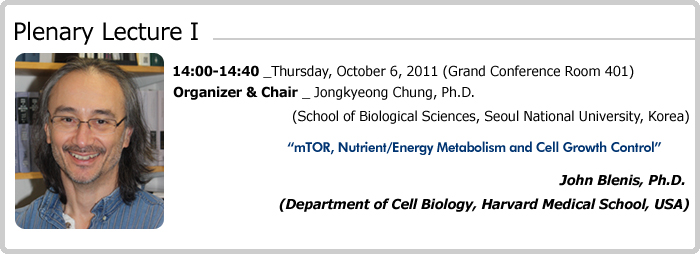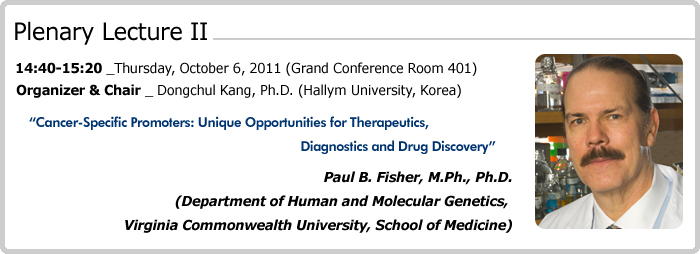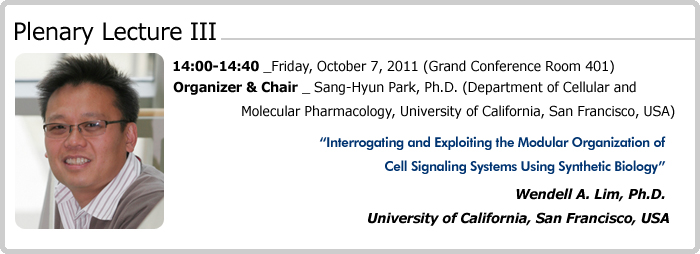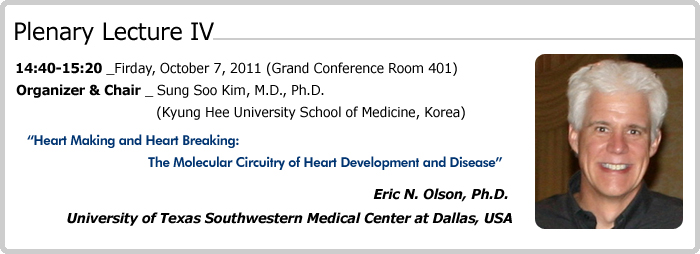|
|
| |
 |
| |
 |
| |
John Blenis, Ph.D., is in the Department of Cell Biology at Harvard Medical School since 1989. He was promoted to Professor in 1996 and became a member of the WCI-KRIBB program in 2010. Prior to joining Harvard Medical School, Dr. Blenis trained in the laboratory of Professor Raymond L. Erikson at Harvard University.
The Blenis laboratory utilizes molecular, cell biological and biochemical approaches to understand how altered cellular signaling and metabolism contributes to the tumor cell phenotype. Current efforts are designed to understand how PI3-kinase, Ras and mTOR signal transduction systems are regulated and affect normal and disease-related modulation of cellular metabolism, protein synthesis, cell survival and cell death, migration and invasion, and cell growth and proliferation. Ultimately, this knowledge will be used to identify pathway specific small molecule inhibitors, develop biomarker assays for disease detection, and produce strategies for personalized therapeutic approaches.
Dr. Blenis is a leader in defining how Ras and PI3-kinase proto-oncoproteins regulate cellular signaling in normal and cancer cells. Dr. Blenis was among the first to demonstrate that Ras mediated signaling from tyrosine kinases to the serine/threonine kinases Raf, ERK and RSK. He showed that activated ERK and RSK rapidly accumulate in the nucleus, revealing how cell surface signals reach the nucleus to alter gene expression. He then demonstrated how several induced gene products act as molecular sensors converting subtle differences in ERK and RSK signals into specific biological responses. In parallel studies, Dr. Blenis discovered that S6 kinase acts downstream of phosphatidylinositols modified by PI3-kinase. He also found that S6 kinase activation is inhibited by the natural product rapamycin, now in clinical trials for various cancers. These data established links between PI3-kinase, mTOR and S6 kinase, and Dr. Blenis is a leader in defining this complex signaling system. Recently, Dr. Blenis illuminated complex mechanisms by which mTOR and S6 kinase regulate protein synthesis and cell growth. Many of these pathway components are now targets for drug development.
Dr. Blenis has published over 140 peer-reviewed articles and is the recipient of several awards including Research Award from the American Cancer Society, Established Investigator Award from the American Heart Association, John A. Boezi Memorial Alumnus Award from Michigan State University, the NIH/NCI MERIT award for his work on cellular transformation by the Ras-ERK/MAP kinase pathway, and the LAM Foundation Established Investigator Award.
|
 |
| |
Paul B. Fisher, MPh, PhD, is Professor and Chair of the Department of Human & Molecular Genetics, Founding Director, VCU Institute of Molecular Medicine and holder of the Thelma Newmeyer Corman Chair in Cancer Research in the VCU Massey Cancer Center, Virginia Commonwealth University, School of Medicine, Richmond, Virginia. Prior to this position he was Professor of Clinical Pathology, Director of Neuro-Oncology Research and the Michael and Stella Chernow Urological Cancer Research Scientist in Columbia University, College of Physicians and Surgeons in New York. Dr. Fisher’s research focuses on comprehending the molecular and biochemical basis of cancer progression to metastasis and defining improved methods for cancer detection, chemoprevention and therapy. His research also addresses mechanisms of neurodegeneration and infectious diseases. Dr. Fisher pioneered subtraction hybridization in the 1990’s to identify and clone novel genes involved in important physiological processes. Using this approach his research group was the first to clone: the cyclin-dependent kinase inhibitor p21 as melanoma differentiation-associated gene-6 (mda-6); the novel IL-10 gene family member mda-7/IL-24 that selectively induces apoptosis or toxic autophagy uniquely in multiple cancers without affecting normal cells; mda-5, a patent receptor for double-stranded RNA that is a key component of the innate immune process; human polynucleotide phosphorylase, a RNA degrading enzyme targeting specific RNAs such as c-myc for destruction and induces cellular senescence; astrocyte elevated gene-1 (AEG-1) a unique gene that is upregulated in multiple cancers (including those of brain, breast, esophagus, prostate and liver) and is a potential therapeutic target; and genes upregulated or downregulated during cancer progression. One initially novel gene of particular importance cloned by this approach, mda-7/IL-24 has been tested in vivo in patients and been found to be safe and display significant clinical activity when administered intratumorally in diverse advanced cancers. His laboratory has isolated several novel gene promoters, including progression elevated gene-3 promoter (PEG-Prom), and demonstrated expression at elevated levels in virtually all cancers of both rodent and human origins. The PEG-Prom was used to create therapeutic viruses that replicate only in cancer cells and produce mda-7/IL-24 (Cancer Terminator Virus) and to image primary tumors and metastases in vivo in animals. The PEG-Prom is also being used as a small molecule-screening platform to identify molecular probes for interrogating known and novel targets mediating cellular transformation, tumorigenesis and metastasis. Dr. Fisher is among the unique top 5% of NIH funded investigators over the past 30 years. He is currently PI on a multi-institutional program project grant, three R01 grants, an IRACDA grant, an R03 grant and private foundation grants from the National Foundation for Cancer Research and the Samuel Waxman Cancer Research Foundation. Dr. Fisher has published over 400 primary papers and reviews including articles in Cell, Science and Nature, served on numerous NIH study sections and government and private grant review panels, and has over 50 issued patents. He is on 18 Editorial Boards including Cancer Research (Breaking Advances Editor), Molecular Therapy, and Cancer Biology & Therapy and is Co-Editor in Chief of Advances in Cancer Research. He was the founder of GenQuest a functional genomics company that merged with Corixa Corporation was traded on NASDAQ and was acquired by Glaxo-SmithKline. |
 |
| |
Dr. Wendell Lim is Professor of Cellular and Molecular Pharmacology at the University of California, San Francisco and an investigator of the Howard Hughes Medical Institute. He received his A.B. in chemistry from Harvard University and his Ph.D. in biochemistry and biophysics from the Massachusetts Institute of Technology.
He a pioneer in the field of Synthetic Biology, where scientists create new or precisely modified systems by rearranging biological components. Dr. Lim believes that cell systems rely on modules, the biological equivalent of electronic components. One way to understand how “natural” systems work is to take these components apart, rearranging, rewiring, and soldering them into “nonnatural” circuits. It’s a way of “letting the organism tell you what’s important in order to be able to perform a certain function,” Dr. Lim says. In numerous landmark papers published in Science, Nature and Cell, he has shown that cell signaling pathways are actually built from modular components which can be artificially rewired to reprogram signaling systems. These biological modules are reused in different cells and organisms to accomplish various tasks. An example of one such module is a scaffold protein that can simultaneously bind to many other proteins. Dr. Lim describes these molecules as the wiring that promotes efficient communication with the right partners and prevents crosstalk with the wrong ones. But little is known about these critical nodes, he notes, so his lab is trying to figure out how they direct the flow of information. One way to tease out the contributions of each of biology's modular components, he says, is to build cell signaling systems from scratch. Dr. Lim believes that by linking these components into functional systems, this noble engineering approach offers a way to understand how the pieces fit and functions together.
Currently, he is Director of the NIH Nanomedicine Development Center and Deputy Director of the National Science Foundation Synthetic Biology Engineering Research Center.
|
 |
| |
Eric Olson has dedicated his career to deciphering the mechanisms that control muscle gene regulation and development. His most recent work has focused on the genetic pathways responsible for congenital and acquired cardiovascular disease. Dr. Olson grew up in North Carolina where he attended Wake Forest University and received a B.A. in Chemistry and Biology in 1977, a Ph.D. in Biochemistry in 1981 and an honorary doctorate in 2003. After postdoctoral training with Luis Glaser at Washington University School of Medicine, he joined the Department of Biochemistry and Molecular Biology at The M. D. Anderson Cancer Center in 1984 and became Professor and Chairman in 1991. In 1995, he founded the Department of Molecular Biology at The University of Texas Southwestern Medical Center at Dallas. Dr. Olson’s honors include the Basic Research Prize, the Founding Distinguished Scientist Award, and the Research Achievement Award from the American Heart Association, the Pasarow Medical Research Award in Cardiovascular Disease, the Gill Heart Institute Award, the Lucian Award for Research in Cardiovascular Disease, the Outstanding Investigator Award from the International Society for Heart Research, and the Pollin Prize for Lifetime Contributions to Pediatric Research. In 2009, the Institut de France and French Academy of Science awarded Dr. Olson the Fondation Lefoulon-Delalande Grand Prize, considered the largest international award in cardiovascular medicine. He is a member of the American Academy of Arts and Sciences, the National Academy of Sciences, and its Institute of Medicine. In his spare time, Eric Olson plays guitar and harmonica with The Transactivators, a rock band inspired by the Texas icon, Willie Nelson, who created the Professorship that Olson holds.
|
|
|
|
|

